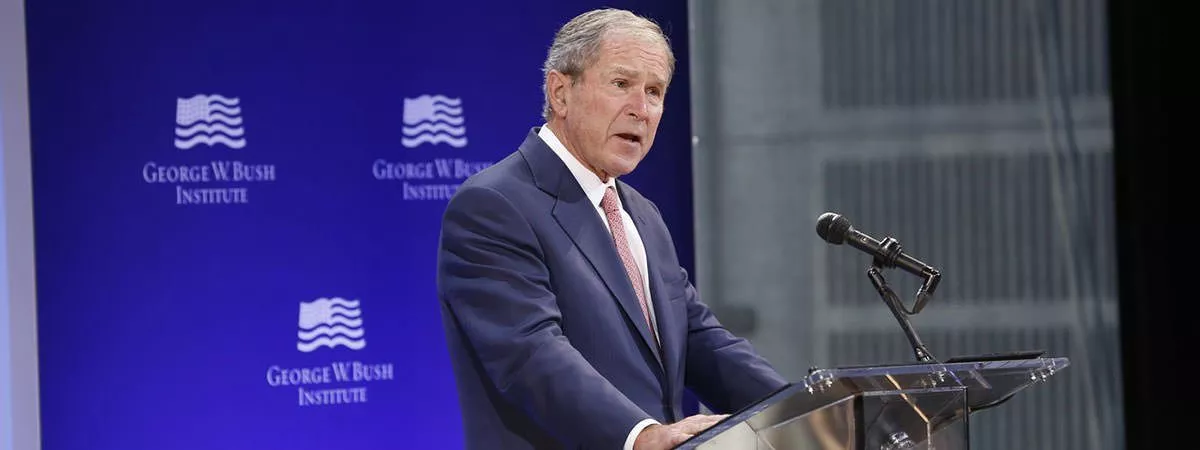George Walker Bush (born July 6, 1946) is an American politician who served as the 43rd President of the United States from 2001 to 2009. Before becoming president, he served in the US Navy, ran a small oil exploration company and served as the 46th Governor of Texas from 1995 to 2000. As President, the domestic policy of Bush saw efforts to improve the national security, health care system, education system and genetic discrimination. The foreign policy of Bush was dominated by tackling of the 9/11 attacks in 2001 and its aftermath. In response, Bush launched an international military campaign called the ‘Global War on Terrorism’ resulting in American war efforts in Afghanistan and Iraq. He is also credited with improving relations of the United States with several nations, most prominently in Africa, where he launched the Emergency Plan for AIDS relief. Bush has been honored with numerous honors including the Order of the Star of Romania and the Philadelphia Liberty Medal. Here are the 10 major accomplishments of George Walker Bush.
#1 HE SERVED AS THE 46TH GOVERNOR OF TEXAS
George W. Bush attended Yale University and graduated with a Bachelor of Arts degree in history in 1968. After graduating, he worked in the oil industry. He also pursued an MBA degree from Harvard Business School and is the only American president to have earned an MBA. In 1978, Bush ran for the House of Representatives from Texas’s 19th congressional district but lost the election with 46.8% of the vote to his opponent Kent Hance’s 53.2%. Bush served as a Campaign Advisor and liaison to the media assisting his father by campaigning across the country for his 1992 presidential re-election campaign. In 1994, Bush ran against popular Democrat incumbent Ann Richards for the post of Governor of Texas and won. He was re-elected in 1998 in a landslide victory becoming the first governor in Texas history to be elected to two consecutive four-year terms. However, he didn’t complete his tenure because of his resignation as governor following his election as President. George Bush served as the 46th Governor of Texas from 1995 to 2000.

#2 HE MADE TEXAS THE LEADING PRODUCER OF WIND-POWERED ELECTRICITY IN U.S.
As governor of Texas, Bush was successful in bringing forth new legislative measures to reform the criminal justice system and was instrumental in increasing funding for elementary and secondary education. This led to a higher standard of education and teachers were paid according to students’ performance on standardized tests. He also extended government funding to organizations involved in combating domestic violence as well as substance and alcohol abuse. Bush took a keen interest in the renewable energy capabilities of his state. He made wind power an essential facet in its renewable energy policy in 1995. Taking this further, in 1999, he passed a Texas state law which made it mandatory for Texas power companies and electric retailers to buy a stipulated amount of energy from renewable sources. It also mandated them to produce 2,000 new megawatts of electricity using renewable sources by 2009. This eventually saw the Wind Power Industry to witness a boom in Texas. Due to the efforts of George Bush as governor, Texas eventually become the leading producer of wind-powered electricity in the United States.
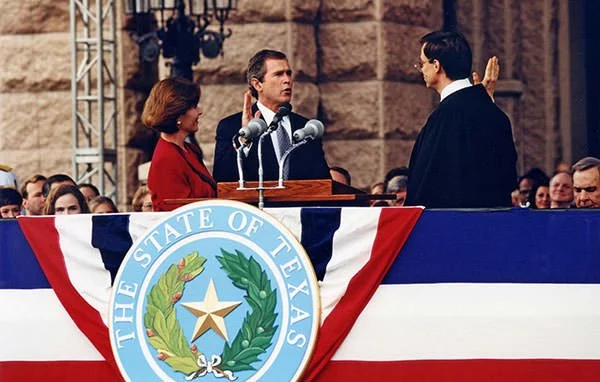
#3 HE SERVED AS 43RD PRESIDENT OF THE UNITED STATES
In June 1999, Bush announced his candidacy for the Republican nomination for president. He was already known at the national level after his successful stint as the Governor of Texas. His campaign for president focused on the reduction of taxes, improving the state of education, supporting minority causes and expanding the United States Armed Forces. In the United States Presidential Election of 2000, Bush defeated Democratic nominee Al Gore, the incumbent vice president, in a closely fought election. Bush lost the popular vote acquiring 47.87% compared to Gore’s 48.38%. However, he gathered 271 electoral votes to Gore’s 266. Bush also won the 2004 United States Presidential Election by defeating Democratic nominee John Kerry. He got 50.71% of the popular vote and gathered 286 electoral votes to Kerry’s 251. George W. Bush served as the 43rd President of the United States from January 20, 2001 to January 20, 2009.
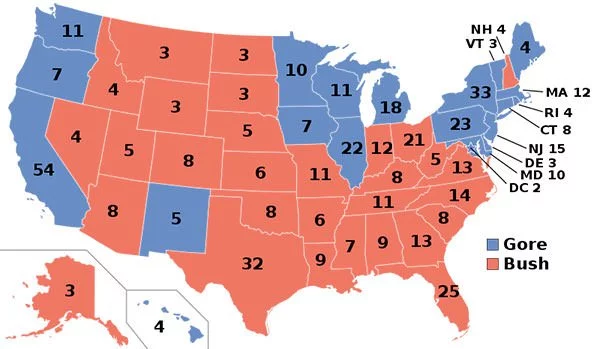
#4 HE STRENGTHENED NATIONAL SECURITY THROUGH THE PATRIOTIC ACT
On September 11, 2001, Al-Qaeda terrorists hijacked four airliners and flew two of them into the twin towers of the World Trade Center while another one crashed into Pentagon. More than 3000 people lost their lives and what followed was a series of government initiatives to counter terrorism. The most prominent among them was USA-Patriot or ‘Uniting and Strengthening America by Providing Appropriate Tools Required to Intercept and Obstruct Terrorism’. Signed into law by President Bush on October 26, 2001, the Patriot Act gave various US intelligence agencies the right to share critical information among each other without bureaucratic barrier. Moreover, it expanded the government’s domestic authority to conduct surveillance of suspected terrorists and authorized the use of roving wiretaps to investigate terror-related crimes. It also updated old federal laws to account for technological advancement in the era of the internet and equipped federal law officials and agencies with appropriate tools to combat terrorism.

#5 HE LAUNCHED THE GLOBAL WAR ON TERRORISM
In response to the 9/11 terrorist attacks, George W Bush launched a ‘Global War on Terrorism’. Some of its objectives were to defeat and destroy extremist terrorist outfits like Al Qaeda and the Islamic State along with their leaders like 9/11 mastermind Osama Bin Laden; to end state sponsorship of terrorism; and to establish, strengthen and maintain an international standard of responsibility concerning combating terrorism. This led to the War In Afghanistan (‘Operation Enduring Freedom’) in October 2001 and the War in Iraq (‘Operation Iraqi Freedom’) in March 2003. The Bush administration had warned the Taliban government of Afghanistan of an attack if they did not hand the Al Qaeda officials responsible for 9/11. As the latter failed to do so, the US invaded Afghanistan. The War on Iraq was based on the rationale that the Iraqi government was hostile and that it possessed weapons of mass destruction. While the War on Terror did lead to destruction of many terrorist outfits and the eventual capture and execution of Iraqi dictator Saddam Hussein, it was also responsible for complete destabilization of countries, violation of human rights and death of innocent civilians.
#6 HE WAS RESPONSIBLE FOR IMPROVED RELATIONS WITH NUMEROUS NATIONS
Bush pursued and signed free trade agreements with several countries, including Australia, Bahrain, Chile, Morocco, Oman, Peru, Singapore, Ukraine and six countries under the Central American Free Trade Agreement. Relations with New Zealand improved and became increasingly closer especially after the Labor Prime Minister Helen Clark visited the White House on March 22, 2007. Bush was also responsible for improved relationships with Asian countries including India, Japan, South Korea and China. Since the US government had done work to reduce the HIV/AIDS epidemics in Africa and rebuild broken nations from their genocidal pasts, relations with Africa improved in leaps and bounds. As stated by Time Magazine, that Africa is the “triumph of American foreign policy” and is “Bush Administration’s greatest achievement”.

#7 HE REFORMED AMERICAN EDUCATION AND HEALTHCARE SYSTEM
In January 2002, Bush signed the No Child Left Behind Act which brought in considerable reforms in the education system and changed the curriculum of public elementary, middle and high schools of the United States. Under this law, mandatory administration of annual tests was required from state schools in order to gauge skills and monitor the progress of the performance of students. In the event the students’ performance did not meet the standard required, sanctions were put in place and complete replacement of staff and teachers was initiated. Bush also enacted policies to help Americans receive care at an affordable price while infusing transparency and innovation into the healthcare system. On December 8, 2003, President Bush signed into law the Medicare Modernization Act. It resulted in the greatest expansion in America’s welfare state since 1965. The act included major changes to the Medicare program by providing beneficiaries with assistance in paying for prescription drugs while relying on private insurance for the delivery of benefits. The president also created tax-free Health Savings Accounts to help Americans take charge of their health care decision-making. Moreover, funding for medical research was increased which contributed to medical breakthroughs such as the development of the HPV Cancer Vaccine.
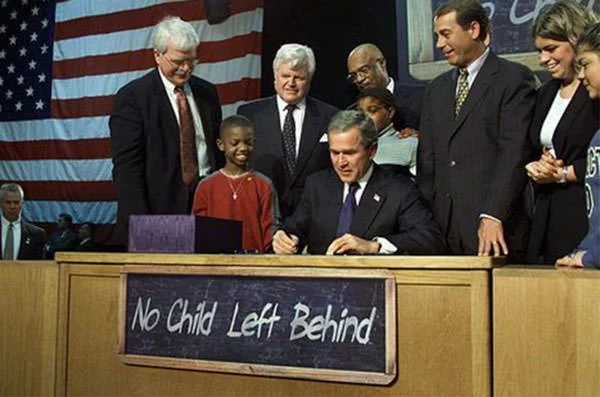
#8 BUSH PROHIBITED THE PRACTICE OF GENETIC DISCRIMINATION
On May 21, 2008, Bush signed into law the Genetic Information Non-discrimination Act (GINA). The bill had passed the Senate unanimously and the House by a vote of 414 to 1. GINA aimed to protect Americans against health insurance and employment discrimination based on a person’s genetic information. The law prohibits health insurers from denying coverage to a healthy individual or charging that person higher premiums based solely on a genetic predisposition. On the other hand, it bars employers from using individuals’ genetic information during hiring, firing, job placement or promotion. The measure was designed to protect citizens without hindering genetic research. According to Senator Ted Kennedy, it was the “first major new civil rights bill of the new century.”
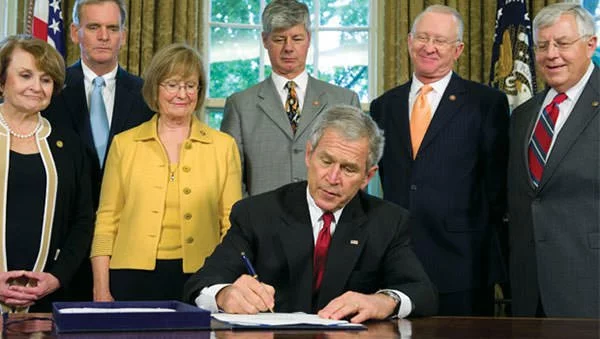
#9 HE LAUNCHED THE PRESIDENT’S EMERGENCY PLAN FOR AIDS RELIEF
George W. Bush and his wife, Laura Bush, had developed a profound interest in improving the fate of the people of Africa who were diagnosed with HIV/AIDS after visiting the Gambia in 1990. In 2003, President Bush launched the President’s Emergency Plan For AIDS Relief, also called PEPFAR. It is a bilateral commitment by the United States government to address the global HIV/AIDS epidemic and help save the lives of those suffering from the disease. It created the Office of the Global AIDS Coordinator (OGAC) to manage and coordinate U.S. Government-supported HIV/AIDS programs in developing countries. PEPFAR has provided more than $80 billion in cumulative funding for HIV/AIDS treatment, prevention, and research since its inception, making it the largest global health program focused on a single disease in history. It has been implemented by a combination of U.S. government agencies in over 50 countries and is widely credited for helping save millions of lives, primarily in Sub-Saharan Africa. The latest results (Nov 27, 2018) show PEPFAR has saved over 17 million lives.
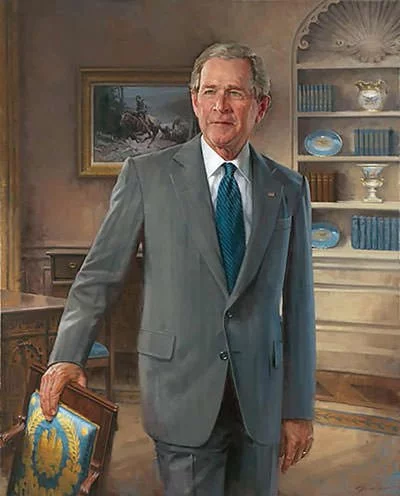
#10 HE WAS AWARDED THE ORDER OF THE STAR OF ROMANIA
In November 2002, Romania was invited to join the North Atlantic Treaty Organization (NATO). President George W. Bush helped commemorate Romania’s NATO accession when he visited Bucharest the same year. Being a consistently pro-American nation, he congratulated the Romanian people on building democratic institutions and a market economy after the fall of communism. In 2002, George W. Bush was awarded the Order of the Star of Romania, the highest civilian honor in Romania. He was named the ‘Person of the Year’ by TIME magazine in 2000 and 2004. In 2005, Latvian President Vaira Viķe-Freiberga awarded him the Order of the Three Stars. In 2012, Estonian President Toomas Hendrik Ilves bestowed him with the Order of the Cross of Terra Mariana. In 2018, George W. Bush, along with his wife Laura Bush, were awarded the Philadelphia Liberty Medal for their work towards helping post 9/11 veterans return to civilian life. The Bush Institute’s Military Service Initiative was instrumental in honoring the sacrifice and service of all post-9/11 veterans. It was successful in taking care of the health and well being of veterans and their families on a large scale.

